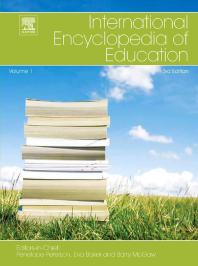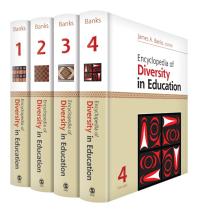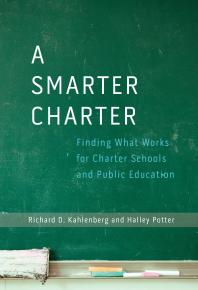Find Reference Resources
Reference works are a great way to get an introduction to a subject. They may contain specific information or introductory articles. Types of reference sources include encyclopedias, dictionaries, handbooks, atlases, and more.
On this page, you will find reference sources specific to Education research and related topics.
Reference Resources
Early childhood education : an international encyclopedia
For educators, professionals, and parents, this reference provides A-Z entries in the first three volumes (with most entries pertaining to the U.S.). Volume Four contains narratives of current approaches to early childhood education in ten countries other than the U.S., providing an international approach to the topic. The countries are Australia, Brazil, China, the Czech Republic, France, Italy, Japan, South Africa, Sweden, and the UK; an introduction to each country's early childhood education is provided by one of the international editors. Several specialists contributed topical essays for each country section on issues such as access, theory, national curriculum, day care, and research, with bibliography provided for each. There are over 300 A-Z entries on subjects that include child care, leading organizations, curriculum, family and society, health, special needs, and professional groups and journals. Many entries are also provided on significant issues, trends, and controversies, and biographies.
International encyclopedia of education
The field of education has experienced extraordinary technological, societal, and institutional change in recent years, making it one of the most fascinating yet complex fields of study in social science. Unequalled in its combination of authoritative scholarship and comprehensive coverage, International Encyclopedia of Education, Third Edition succeeds two highly successful previous editions (1985, 1994) in aiming to encapsulate research in this vibrant field for the twenty-first century reader. Under development for five years, this work encompasses over 1,000 articles across 24 individual areas of coverage, and is expected to become the dominant resource in the field. Education is a multidisciplinary and international field drawing on a wide range of social sciences and humanities disciplines, and this new edition comprehensively matches this diversity. The diverse background and multidisciplinary subject coverage of the Editorial Board ensure a balanced and objective academic framework, with 1,500 contributors representing over 100 countries, capturing a complete portrait of this evolving field. A totally new work, revamped with a wholly new editorial board, structure and brand-new list of meta-sections and articles Developed by an international panel of editors and authors drawn from senior academia Web-enhanced with supplementary multimedia audio and video files, hotlinked to relevant references and sources for further study Incorporates ca. 1,350 articles, with timely coverage of such topics as technology and learning, demography and social change, globalization, and adult learning, to name a few Offers two content delivery options - print and online - the latter of which provides anytime, anywhere access for multiple users and superior search functionality via ScienceDirect, as well as multimedia content, including audio and video files

Encyclopedia of Diversity in Education
The diversity education literature, both nationally and internationally, is broad and diffuse. Consequently, there needs to be a systematic and logical way to organize and present the state of research for students and professionals. American citizens need to understand the dynamics of their increasingly diverse communities and institutions and the global world in which we live, work, and lead. With continually evolving information on diversity policies, practices, and programs, it is important to have one place where students, scholars, teachers, and policymakers can examine and explore research, policy, and practice issues and find answers to important questions about how diversity in U.S. education—enriched with theories, research and practices in other nations—are explained and communicated, and how they affect institutional change at both the K-12 and postsecondary levels. This four-volume reference work will be the definitive reference for diversity issues in education in the United States and the world.

A smarter charter : finding what works for charter schools and public education
Moving beyond the debate over whether or not charter schools should exist, A Smarter Charter wrestles with the question of what kind of charter schools we should encourage. The authors begin by tracing the evolution of charter schools from teacher union leader Albert Shanker’s original vision of giving teachers room to innovate while educating a diverse population of students, to today’s charter schools where the majority of teachers are not unionized and student segregation levels are even higher than in traditional public schools. In the second half of the book, the authors examine two key reforms currently seen in a small but growing number of charter schools―teacher voice and socioeconomic integration―that have the potential to improve performance and reshape the stereotypical image of what it means to be a charter school.
Important reading for policymakers, educators, researchers, and all citizens interested in the future of America’s public schools, A Smarter Charter features:
- Profiles of charter schools that are bucking the prevailing trends, including their performance data and the challenges they face.
- Best practices from successful charter schools, such as methods for attracting a diverse student body and examples of innovative teacher contracts.
- Reform strategies that can improve student outcomes in a variety of public schools, not just charters.

General Research Databases
-
AM Research Skills This link opens in a new window
Includes nearly 200 hundred essays, videos, "How to" guides and case studies by subject specialists which answer questions about working with primary sources. Materials provide guidance on where to find historical documents, and how to best to approach analyzing the content they hold.
-
Gale eBooks This link opens in a new window
Explore this database of encyclopedias and reference sources within the Gale eBooks platform. For multidisciplinary research.
-
Oxford Reference This link opens in a new window
An online reference product, spanning 22 different subject areas, bringing together 2 million digitized entries across Oxford University Press’s Dictionaries, Companions and Encyclopedias. Olin Library subscribes to select titles; full text may not be available for content we don’t subscribe to.
-
Sage Research Methods This link opens in a new window
Sage Research Methods supports research at all levels by providing material to guide users through every step of the research process.
Research Tip
You might notice that the print books highlighted here have a call number that starts with LB or LC. This is the area of the library where you will find books covering Education. In the Olin Library it's on the 3rd floor (one flight up from the Main Floor where you enter). Turn left when you reach the 3rd floor and look for the L's on the book spines.
| Call Number Starts With | Topic Covered |
| L | Education (General) |
| LA | History of education |
| LB | Theory and practice of education |
| LC | Special aspects of education |
| LD | Individual institutions - United States |
| LE | Individual institutions - America (except United States) |
| LF | Individual institutions - Europe |
| LG | Individual institutions - Asia, Africa, Indian Ocean islands, Australia, New Zealand, Pacific islands |
| LH | College and school magazines and papers |
| LJ | Student fraternities and socieites, United States |
| LT | Textbooks |
Your Librarian
Need Research Support?
- Schedule a research appointment with Your Librarian
- Schedule an appointment with the Tutoring & Writing Center
- Search the library FAQ
Contact Us
Your Librarians here at Olin Library are ready to assist and guide you on your research journey.
- Call us at 407-646-2521
- Text us at 407-874-5909
- Email us at askolinlibrary@rollins.edu
